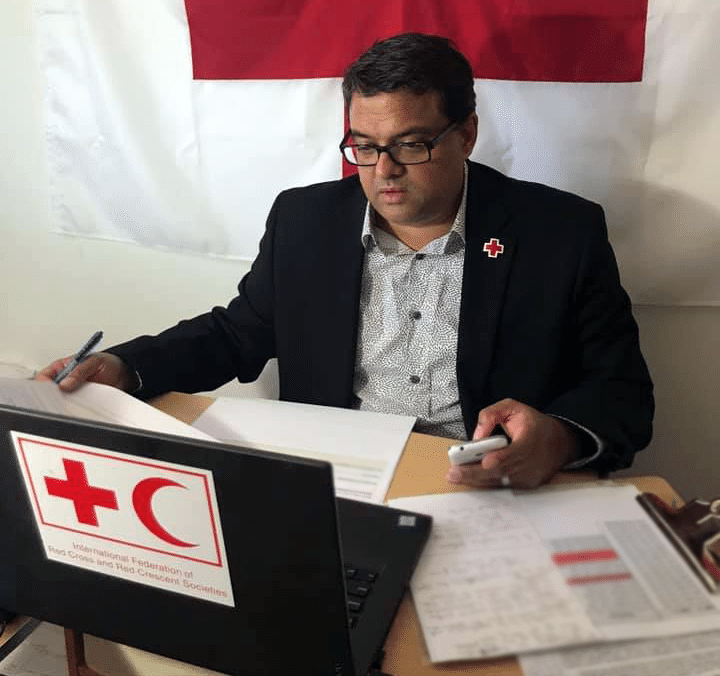
Seven years ago, American Red Cross worker Colin Chaperon deployed to Ukraine to support a cash voucher assistance program. He’s once again packing his bags and heading to the region to support the current Ukraine crisis.
This time, he’ll serve as the head of operations for the International Federation of Red Cross and Red Crescent Societies’ response based in Budapest, Hungary. Colin says he’s excited and that he and his colleagues within the Red Cross Movement view themselves as a new generation of operational leaders who stand ready to meet the moment’s complex challenges.
“As humanitarians, our goal is to alleviate human suffering, and through our work at the Red Cross, we are honored and privileged to be entrusted with this responsibility,” he said.
In his regular day-to-day role, Colin is a member of the International Services department, leading the Red Cross’ global COVID-19 response as well as international disasters in Africa. In this way, he works with Red Cross and Red Crescent partners within the movement to support emergencies such as earthquakes, droughts and health epidemics and pandemics, including COVID-19. He and his colleagues work to advocate for and leverage humanitarian assistance for disasters around the world.
“We exist as part of a global community. We are surrounded by people from the diaspora of various countries within our own communities and those communities are diverse in terms of socioeconomics, culture and religion, we are more connected than ever before,” Colin said.
Colin says to do international work well empathy is key. “Often, people have lost everything, including loss of hope. I think that’s what the Red Cross is able to re-instill in their hearts in a renewed sense of hope — in those early hours, days, weeks and sometimes months following a disaster,” he said.
Colin grew up in Zimbabwe, where his first exposure to the Red Cross was in the 1970s and 1980s when neighboring Mozambique was at civil war. As many Mozambicans sought refuge in Zimbabwe, he was inspired to see how the Red Cross supported people in need.
Years later, following his studies, he immigrated to the U.S. and wasn’t sure what he wanted to do professionally. “All I knew is that I wanted to do something internationally,” he said.
He started as a Red Cross volunteer in Gainesville, Florida and relocated to Arlington, Virginia, just before September 11, 2001. After the attack on the Pentagon, Colin got involved as a disaster volunteer assisting with the overnight shifts and then worked at the local chapter. Since 2006, he’s worked in international services focusing on disaster response.
“I guess you could say my work has followed the theme of local to global,” he said with a laugh.
Over the years, Colin has deployed both domestically across the U.S. and more than 20 times supporting response operations across the world — including roles in Latin America and the Caribbean, Europe, Africa and Asia.
Having been born and raised in southern Africa, and having worked across diverse cultures and religions, Colin says he appreciates the inherent power of bringing people of diverse backgrounds together. He considers himself to be a connector of people — and lives his life following the African proverb that says, “go alone, go fast — go together, go far.”
For Colin, there are three key components of international disaster response — equity, complexity and flexibility. He stresses that today, more consideration is given to equity — aiming to help the most vulnerable — not just in the Red Cross Movement but in humanitarian work overall.
“It’s not that everybody gets the same slice of the cake,” he said. “It’s that the person who’s the most vulnerable, perhaps qualifies to receive a bit more assistance, a bit more of the cake, because that would, in turn, help them, alleviate their suffering and increase their coping mechanisms.”
Colin says that the complexity of international disasters requires patience and flexibility. “There’s a push in our society to want to solve complex problems instantly. The challenge for humanitarians is to take these nuanced and multifaceted challenges and offer robust and dynamic solutions,” he said.
“If you’ve ever been to a disaster, you know you have to be flexible,” he added. “The situation on the ground changes, the needs change and we often need to work together to fund the best solutions possible.”
This story is part of an American Red Cross Force for Good blog series, featuring dedicated Red Cross workers whose exceptional contributions to our humanitarian mission enable us to help and support people in communities across the country.
